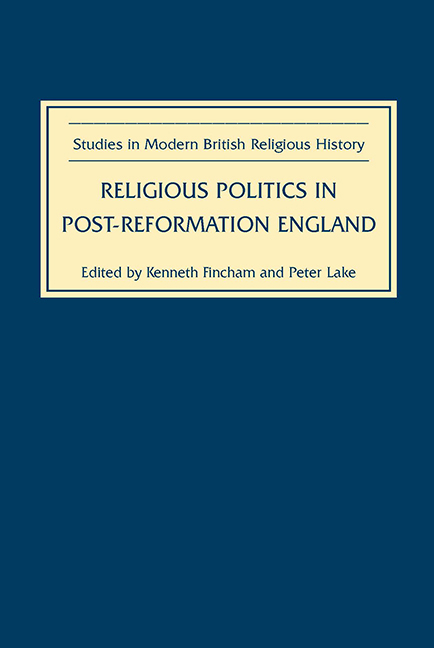Book contents
- Frontmatter
- CONTENTS
- Dedicaton
- Miscellaneous Frontmatter
- Preface
- Abbreviations
- 1 Introduction: Puritanism, Arminianism and Nicholas Tyacke
- 2 Art and Iconoclasm in Early Modern England
- 3 The Latitude of the Church of England
- 4 Joan of Contention: The Myth of the Female Pope in Early Modern England
- 5 Anti-Puritanism: The Structure of a Prejudice
- 6 The Fortunes of English Puritanism: An Elizabethan Perspective
- 7 What's in a Name? Dudley Fenner and the Peculiarities of Puritan Nomenclature
- 8 Puritan Preachers and their Patrons
- 9 New England's Reformation: ‘Wee shall be as a Citty upon a Hill, the Eies of All People are upon Us’
- 10 ‘Anglicanism’ by Stealth: The Career and Influence of John Overall
- 11 Destroyed for doing my Duty: Thomas Felton and the Penal Laws under Elizabeth and James I
- 12 Charles I and Providence
- 13 John Shawe and Edward Bowles: Civic Preachers at Peace and War
- 14 Material Evidence: The Religious Legacy of the Interregnum at St George Tombland, Norwich
- Index
- Tabula Gratulatoria
- Studies in Modern British Religious History
8 - Puritan Preachers and their Patrons
Published online by Cambridge University Press: 25 October 2017
- Frontmatter
- CONTENTS
- Dedicaton
- Miscellaneous Frontmatter
- Preface
- Abbreviations
- 1 Introduction: Puritanism, Arminianism and Nicholas Tyacke
- 2 Art and Iconoclasm in Early Modern England
- 3 The Latitude of the Church of England
- 4 Joan of Contention: The Myth of the Female Pope in Early Modern England
- 5 Anti-Puritanism: The Structure of a Prejudice
- 6 The Fortunes of English Puritanism: An Elizabethan Perspective
- 7 What's in a Name? Dudley Fenner and the Peculiarities of Puritan Nomenclature
- 8 Puritan Preachers and their Patrons
- 9 New England's Reformation: ‘Wee shall be as a Citty upon a Hill, the Eies of All People are upon Us’
- 10 ‘Anglicanism’ by Stealth: The Career and Influence of John Overall
- 11 Destroyed for doing my Duty: Thomas Felton and the Penal Laws under Elizabeth and James I
- 12 Charles I and Providence
- 13 John Shawe and Edward Bowles: Civic Preachers at Peace and War
- 14 Material Evidence: The Religious Legacy of the Interregnum at St George Tombland, Norwich
- Index
- Tabula Gratulatoria
- Studies in Modern British Religious History
Summary
On 1 August 1654 Simeon Ashe preached the funeral sermon at Rotherhithe, Surrey, for Thomas Gataker, BD, rector for forty-three years and an ‘eminently learned and faithful minister of Jesus Christ’. Ashe published the sermon some months later to which he appended an account of Gataker's life and his ‘patient, comfortable death’. In the epistle dedicatory to ‘my much honored brethren, the Presbyterian ministers of the gospel within the province of London’, Ashe began by mourning the recent loss not only of Gataker but also of William Gouge and Jeremiah Whitaker, ‘members of, but also cordial friends unto our provincial assembly’. Although he mentions the loss of other Presbyterian worthies, naming George Walker, Herbert Palmer, Thomas Edwards, John Gere, Henry Roborough and Christopher Love, he goes on to celebrate the seventy-year struggle to establish the classical system against ‘prelatical power and oppression’, citing ‘a bright crowd of so many witnesses’, who ‘may be relieving to our grieving hearts’. It is altogether a salute to a clerical elite of preachers ‘by your loving brother and fellow laborer in the work of the gospel’, a salute to preachers but no mention of their patrons.
Ashe's narrative of Gataker's life, however, tells a different story. According to Ashe, Gataker's father, a Catholic, was a younger son of a Shropshire gentry family, dispatched to make his way to the inns of court. In turn young Thomas was sent off to St John's, Cambridge, where he met Richard Stock who became a lifelong friend; from St John's Gataker was invited to become one of the fellows of Sidney Sussex College, then in the process of being founded. While waiting for the completion of the new college, he was hired as a tutor by an Essex family, where in addition to instructing the father in Hebrew and the son in Latin literature, he began the practice of explicating biblical passages at family devotions every morning, an exercise which the suffragan bishop of Colchester witnessed and which prompted him to urge the young Gataker to take holy orders, a course seconded by his college tutor, Henry Alvey.
- Type
- Chapter
- Information
- Religious Politics in Post-Reformation England , pp. 128 - 142Publisher: Boydell & BrewerPrint publication year: 2006

